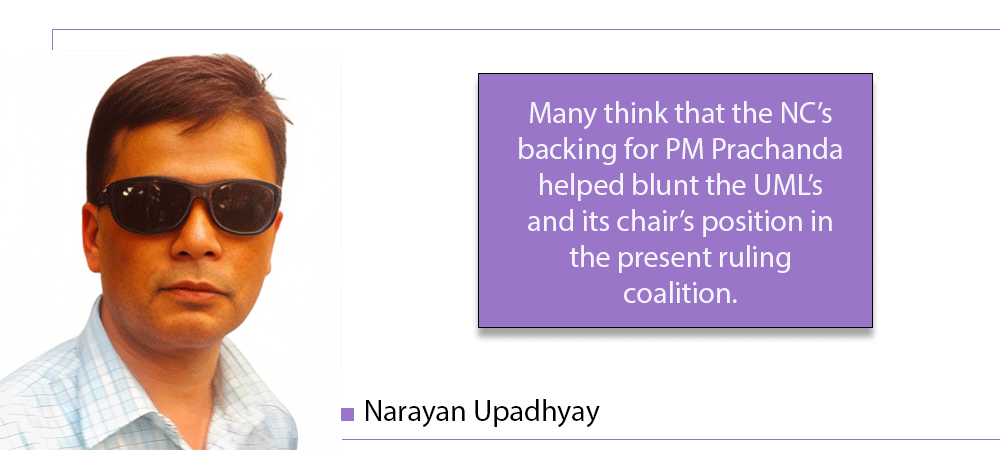- Friday, 20 February 2026
NC On The Horns Of A Dilemma
The Nepali Congress, the largest party in the House of Representatives (HoR), finds itself in a conundrum right now. Even after throwing its weight behind Prime Minister Pushpa Kamal Dahal ‘Prachanda’ when the latter sought the vote of confidence during the HoR’s floor test, the NC asserts itself as the main opposition in the Lower House. Congress opponents claim that the NC cannot be regarded as the main opposition in the House since it has sided with the prime minister, which allowed the prime minister to have a huge House majority. However, the Congress has urged the newly elected House Speaker to provide it with the status of the main opposition party.
After Congress lost to the current ruling alliance due to its “overconfidence” in forming the new government under its leadership, it felt that KP Sharma Oli’s CPN-UML-led current ruling alliance would “walk away” with all the powerful posts — the House Speaker, President, and other key constitutional appointments. As a result, the largest party in the House will have no sway in such appointments, compelling it to extend support to its erstwhile ally, PM Prachanda.
Positive outcome
With unexpected support coming from erstwhile ally, the Nepali Congress, Prime Minister Prachanda has indicated that he would work for a positive outcome to the involvement of the Congress in the constitutional appointments. Now, the NC and its leaders expect that the new climate established by the NC’s backing would lead to an improved understanding between the Prime Minister, the NC, and other parties in choosing a new president who is not a member of the UML. It has left the UML chair, Oli, quite upset. These days, the UML chief spares no chance to condemn Congress for indulging in activities that threaten the ruling alliance’s position.
Meanwhile, many think that the NC’s backing for PM Prachanda helped blunt the UML’s and its chair’s position in the present ruling coalition. Soon after Prachanda became prime minister with the backing of the UML, Rastriya Swatantra Party (RPP), and a few other parties, they created a high-level committee under Oli to watch over the government’s actions. The new body provided Oli greater authority over the Prachanda-led administration. However, once NC President Sher Bahadur Deuba opted to extend his party’s support to Prachanda, any future attempt by Oli to control the administration has been weakened. The UML chair now needs to think twice if he wants to pile pressure on the Prachanda to get things done as per his desires.
Despite opposition from some of his own party members, Deuba had his party back Prachanda, for which the NC chief and his team came under pressure. The decision to support PM Prachanda during the vote of confidence had not gone down well with his fellow party members. They did not make any hue and cry, hoping that the party president’s move would bring future benefits to it. However, the support extended to the PM has created new optimism for the Congress. The Congress leaders are engaged in parleys with parties in the ruling administration to enable it to pick a new president from inside its fold. Or, at least, not from one belonging to the UML.
Like many, the NC concerns that if the major constitutional posts — the House Speaker, President, and Prime Minister — go to one party, then the party is likely to become despotic. Not long ago, when Oli was the prime minister, he dissolved the HoR twice. The President allowed Oli’s move with no hesitation on both occasions. On both occasions, the Supreme Court decided that Oli’s conduct was unconstitutional before reinstating the dissolved House. We still see Oli defending his House dissolution, which has sent fears across the political spectrum, including the Nepali Congress, Maoist Center, and other parties.
President’s power
Meanwhile, observers argue that despite the presidential post is constitutional, the role she or he might play can place a government in a difficult situation. For example, the president can sit on any HoR-ratified bill that needs her or his final approval. Instances have taught us that any Nepali political party that controls the government may transform the Constitutional President into a strong post at any moment if the political situation becomes problematic for it.
The NC is now considering all alternatives for choosing one of its senior party officials as president when the current President, Bidya Devi Bhandari’s tenure expires in one and a half months. Even if it fails in its effort, it wishes to have a fresh face as president who is not from the UML or who is an independent candidate. Politically, the bid, if it succeeds, looks helpful to the Congress, which is still licking its wounds for not backing Prachanda to become the PM for the initial two and a half years and maintaining the party in the ruling coalition. Had they done that, they would elect or appoint in major constitutional offices, including the presidential position. It is still not clear if the Congress will succeed in its attempt. But it has prompted parties in the alliance to reassess their presidential choice.
In conclusion, the decision to enable the NC to have its status as the principal opposition party is now in the hands of the Speaker. If he does not award the party the status, the other two parties, Nepal People’s Front and Nepal Labour and Peasant Party, each of which has a single HoR member, can claim the right to be the major opposition as they are the ones that did not support the PM during floor test. If any of them are granted the status, then that will be an absurd thing in the country’s parliamentary tradition.
(Upadhyay is Managing Editor of this daily.)















